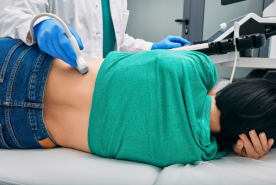May 20, 2020
The symptoms of COVID-19 were difficult for Maryann Starick, a five-year kidney transplant patient, but not as hard to deal with as the anxiety she felt about the disease damaging her kidney.
Maryann, 61, of Cleveland, OH, tested positive for the coronavirus on March 30.
The first week she had intense headaches and fatigue that kept her bedridden. The next week she was extremely dehydrated from constant throwing up, diarrhea, and fever. And the third week she was easily out of breath from even the shortest walks. All and all, it took her a full six weeks to recover, thankfully, entirely at home.
“I think the hardest thing was the anxiety that I would go to the hospital and not come home,” said Maryann. “I didn’t want to never see my family again. There was one night that I didn’t go to sleep because of fear. I even had dreams of being taken to the hospital.”
Her sister’s gift of life
Maryann received a transplant five years ago from her sister, who was her living donor. She needed the transplant because she has IgA nephropathy and was diagnosed 13 years ago. Three years before her transplant, her kidneys failed, and she went on peritoneal dialysis. It wasn’t easy with a teenager still at home, but she made it work. She changed careers to a stay-at-home job when she received the transplant. As an occupational therapist in a school, she felt she would put her compromised immune system at too great a risk. Now, she is a customer service rep for the cruise industry.
Despite caution, still got COVID-19
Though she was already working from home and has always been cautious about her risk of illness, she still contracted the coronavirus, most likely from her husband, she said. He was sick with a mild flu-like illness for about a week right before Maryann contracted the disease. Her husband’s doctor decided not to bother testing him, she said, because it was very mild, and he was over it quickly.
But ever since her transplant, both her husband and Maryann have followed strict hand-washing guidelines. She was active, a walker, and enjoying a good life, she said. Social distancing wasn’t new to her. She stayed away from crowds. And after she first started hearing about COVID-19, she began to step that up and only made occasional trips to the grocery store. She even has a supply of dialysis masks.
“I haven’t gone to a store in weeks,” she said. “I kinda would like to go somewhere though.”
During the bout with COVID-19, Maryann lost 18 pounds, mostly because she could barely eat for days on end.
“It was hard to walk to the bathroom,” she said. “I was very weak.”
It has been seven weeks since she tested positive and she just started working her home job part time. She is finally able to walk a few blocks around her neighborhood without getting short of breath.
Her advice for others
“I am very thankful for the support of my husband and family throughout my illness,” she said.
Her most important advice for any transplant patient is to seek emotional support during these scary times. She is grateful for the many nurses and medical personnel who answered her daily calls with questions. In fact, while she struggled with the virus, she got daily calls, sometimes three times a day, from her team of doctors and nurses checking on her.
“Ask a lot of questions,” she advises other patients. “Reach out for your support as much as possible. Talk about the anxiety this disease creates. I listened to the nurses and it really helped.”
Learn More
COVID-19 hits people differently and is especially hard on patients with kidney transplants. It is important that you take measures to help keep yourself safe and reduce the chance of getting COVID-19. Be sure to wear a mask when you go outside your home. Keep at least 6 feet distance between you and other people. Remember to wash your hands frequently and use hand sanitizer if there are no washing facilities. Avoid touching your eyes, mouth, and nose. For more information about precautions and considerations for kidney disease patients, transplant recipients and living donors, visit https://www.kidney.org/covid-19.


















